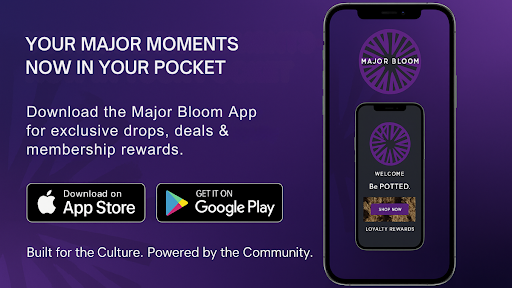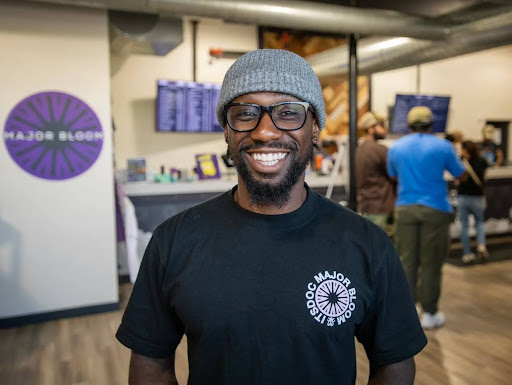For nearly a century, the story of cannabis has been told about us, not by us. The people who consumed it, cultivated it, and healed with it were silenced while those in power used their platforms — newspapers, radio, and television — to shape public perception. Today, that’s changing. As cannabis moves further into legalization and normalization, we’re entering a new era where creators, not corporations or politicians, get to tell the truth about the plant.
At Major Bloom, we believe it’s our responsibility not just to sell cannabis, but to create and share narratives that repair what prohibition broke. Because when it comes to cannabis communications, the divide between consumers and creators is more powerful than ever.
From Rituals to Regulations
Cannabis isn’t new. Our ancestors used it long before it was criminalized: Native communities incorporated it into spiritual rituals, and Asian societies documented its medicinal use as early as 2800 BCE. By the late 1800s, cannabis was listed in American medical journals as a treatment for pain, insomnia, and anxiety. Doctors prescribed tinctures, nurses administered it to patients, and industries used hemp for rope, textiles, and paper.
But, with every use came potential disruption. Hemp threatened paper, textiles, and industrial monopolies. Cannabis as medicine competed with the emerging pharmaceutical market. So in the 1930s, the U.S. government launched one of the most effective propaganda campaigns in modern history, using media to criminalize a plant and the people most connected to it.
From “Reefer Madness” to newspaper headlines calling cannabis users “insane” and “violent,” the message was clear: Cannabis was the enemy. The real targets, though, were communities of color. Black and Brown Americans were arrested at disproportionate rates, feeding mass incarceration and destroying families, while industries built on alcohol and pharmaceuticals continued to thrive.
 100 Years Later: The Narrative Flips
100 Years Later: The Narrative Flips
Fast forward to 2025, and the story is finally changing. Almost every state has legalized or decriminalized cannabis in some form—whether medical, adult-use, or hemp-derived. Polls show that over 70% of Americans support federal legalization, making it one of the most unifying social issues in the country.
Globally, the shift is even more profound. Thailand has opened its market to tourism. Canada and Uruguay maintain federally regulated industries. Europe leads in research and medical applications. And here in Massachusetts, the Cannabis Control Commission has set a national example for equity-driven regulation, generating more than $20 million in social equity funding to reinvest in the communities most harmed by prohibition.
The question now isn’t whether cannabis is legitimate — it’s who controls the conversation about it.
From Propaganda to Participation
The same platforms once used to criminalize cannabis — print, radio, television — are now tools for liberation. And in the digital age, content is culture. Podcasts, live streams, newsletters, and social media all have the power to educate, connect, and normalize.
At Major Bloom, we’re using every one of those channels. For the past four years, our radio show, “Infused Influence,” has aired on WICN 90.5 FM every Thursday at 6 p.m., right here in Worcester. It’s more than a talk show: It’s a living record of the local and national cannabis movement. We’ve had guests like former Massachusetts Senator Harriette Chandler, business owners, community leaders, and everyday people who shape this industry from the ground up.
Now, with the launch of the Major Bloom Mobile App, we’re taking that connection even further. The app lets users place orders, collect rewards, and access exclusive content — but it’s also a communication hub. Soon, community forums will allow patrons to talk directly with us and with each other, sharing experiences, advice, and education without censorship or misinformation.
Because we’ve seen what happens when the wrong people control the narrative. Now it’s time to build a platform where truth, creativity, and community drive the story forward.

A Global Shift Toward Cannabis Creators
The next decade of cannabis won’t be shaped by policymakers or corporations — it’ll be defined by creators. Writers, growers, designers, researchers, and entrepreneurs are all part of reframing how the world sees cannabis. And the U.S., despite its slow federal progress, remains the cultural driver.
Cannabis creators are our modern storytellers, correcting history, challenging stigma, and building new systems of inclusion. Meanwhile, consumers have a new responsibility, too: to seek truth, support ethical brands, and reject propaganda.
The same tools once used to mislead can now heal. That’s the irony, and the opportunity.
From Control to Collaboration
The U.S. government once used cannabis and media to control people. At Major Bloom, we’re using cannabis and media to collaborate with people.
We produce, distribute, and educate with purpose, to give power back to the communities that kept the plant alive through prohibition. The truth about cannabis was never lost; it was buried under headlines and policy. It’s our job, as modern creators, to dig it back up — and make sure it’s never silenced again.
